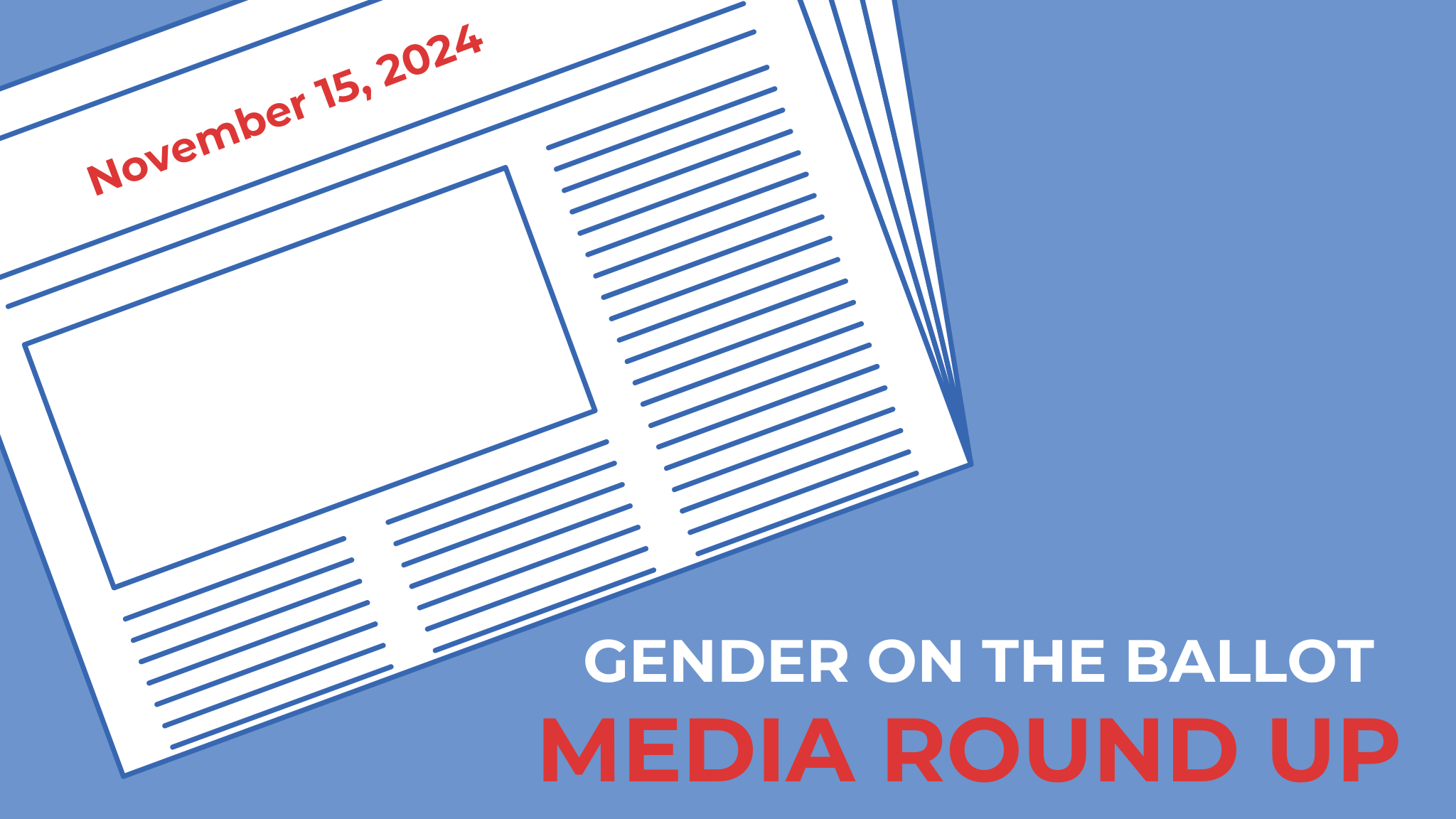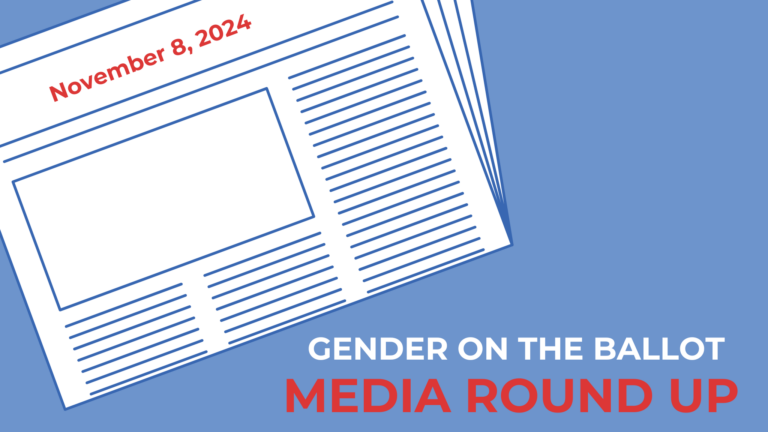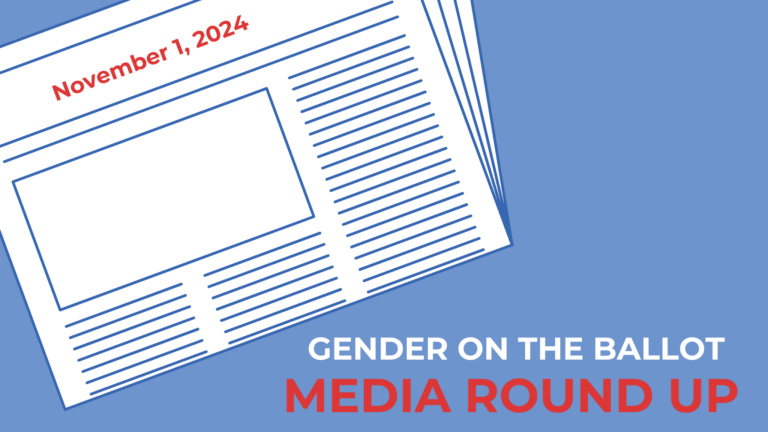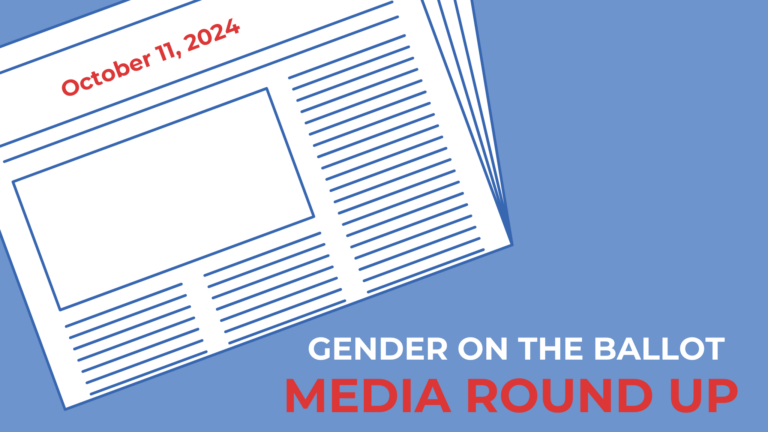Where We Stand: How to keep up with Emerging Election Results With 16 races still…
Weekly Media Round Up: November 15, 2024

Welcome to our Media Round Up. Each week we’re collecting and sharing our favorite gender + politics stories.
Hitting a paywall? Some sources allow a few free articles without a subscription, and your university or local library may offer free access. For example, AU students, faculty, and staff have access to popular newspapers through the library. Click here to learn more.
Women Make History, Yet Barriers Remain
In New Mexico, women have won 60 seats in the state legislature, securing the largest female legislative majority in U.S. history. New Mexico voters are sending 11 additional women from both major political parties to bump-up female representation in the 112-member legislature. Women’s representation in the next (119th) Congress could be at an all-time high, but still far below the share of women in the general population. At least 148 (109D, 39R) women will serve, with 5 women in races still too close to call. So far, women have not reached the record of 151 women currently serving in Congress. In the U.S. Senate, women will remain 25% of those serving. Taking a more nuanced look, incoming members of the U.S. House and Senate include AU Alumna Sarah McBride, who is the first transgender person elected to Congress, and Lisa Blunt Rochester (D), who will become not only the first woman, but also the first Black person to represent Delaware in the U.S. Senate. Angela Alsobrooks (D) will become the first Black woman to represent Maryland in the U.S. Senate, and in Arizona District 3, Yassamin Ansari (D) will become the first Middle Eastern woman to represent her state in Congress, winning her race by over 40 points. Women currently constitute 28 percent of the 118th Congress, up from 17 percent in 2013. “The president has kind of a unique position in our country. And that bar is definitely higher, and it does have a feeling of ‘two steps forward, one step back,’ when it comes down to electing the first woman president,” says Betsy Fischer Martin, the executive director of American University’s Women and Politics Institute. “But,” adds Fischer Martin, “there are plenty of other really positive stories when you think about women in elected office.
Was The Trump Election a Setback for Women? Even Women Do Not Agree
The New York Times, Dionne Searcey
Following the election, The New York Times explores how “womanhood itself has fractured.” Many left-leaning women believe that women who backed Donald Trump voted against their own self-interest, as the election results seemed to contradict “generations of progress made toward women’s equality and for feminism generally.” Women on the other side of the aisle who voted for Trump, however, have exemplified how divided the electorate really is: the idea of sisterhood, where women stick together simply because of their gender, is a “myth with deep roots in American society.” Women themselves cannot agree on whether the results of the election are a setback, as some liberal women point to Trump’s victory as a bad omen for protecting reproductive rights and access to abortion, while some conservative women are hopeful that another Trump presidency will help with border control and the economy.
Trump’s Cabinet Picks
President-elect Donald Trump has announced that he will nominate a number of women to top leadership positions in his cabinet and administration. Trump has tapped House Republican Conference chair and longtime supporter Rep. Elise Stefanik to serve as ambassador to the United Nations, his first Cabinet pick for his second term in the White House. Trump will nominate South Dakota Gov. Kristi Noem (R) to lead the Department of Homeland Security, a role that holds “significant weight” for Trump, who campaigned heavily on the issue of immigration. On Wednesday, Trump also chose Tulsi Gabbard, former Democratic congresswoman who later became one of his most ardent supporters, to serve as the director of national intelligence. Gabbard’s nomination indicates that Trump intends to give top foreign policy jobs to supporters who are “deeply skeptical” of the efficacy of U.S. military intervention abroad.
The Gender Dimensions of the Gen Z Vote: What Both Parties Can Learn
The Hill, Melissa Deckman
Following President-elect Trump’s decisive win, many are wondering where key groups in the polls swung. For Gen Z, it is largely divided by gender. A new study shows that Vice President Kamala Harris led young women by 18 points, and Trump led young men by 15 points. In 2020, Biden had a slight majority win of young men. Trump’s win of Gen Z men follows his campaign strategy of being in the “manosphere” with appearances on young male-dominated spaces like Adin Ross, Joe Rogan, and Logan Paul. Yet, Gen Z men are more supportive of gender equality than their older counterparts, but reluctant to call themselves feminists. Harris, however, focused on young women, who are increasingly more liberal, feminist, and participants in political movements. Many young women cited abortion as their top concern at the polls. To learn more about Dr. Melissa Deckman’s work and new book, The Politics of Gen Z, read her Gender on the Ballot blog post here.
Gendered Responses to the Election
The immediate aftermath of the 2024 Presidential election produced a groundswell of gendered responses to Donald Trump’s second win, one marked with a huge spike in misogynistic, sexist attacks online. White nationalist Nick Fuentes tweeted, “Your body, my choice. Forever,” that garnered over 50,000 likes. One study shows a 4600% increase in the aforementioned phrase and “get back in the kitchen” on X in just a 24-hour period. At the same time, Abortion pill requests skyrocketed last week after Trump’s win, with one company receiving over 10,000 requests in just 24 hours. Reproductive healthcare providers have said that requests for IUDs, and birth control pills also spiked. Speculation about the impact of “trad wives” and homesteader influencers online could explain Trump’s gain with young men and women. Those who are hoping to return to the “good ol’ days” of homemaker wives and working husbands see their mission echoed in Trump’s messaging. Moreover, the 4B movement in South Korea is gaining traction in America after women online express disdain for Trump’s win and the misogyny they receive from men. The movement focuses on a ban of heterosexual relationships, including sex, dating, and boyfriends, as a reaction to rampant sexism and assault in South Korea and abroad.
Changing Attitudes on Gender is Slow Work
Nine experts consider why the United States has yet to elect a woman president, and whether it ever will. WPI ED Betsy Fischer Martin contends that as inspiring as recent gains in women’s political representation have been, it “often feels like we’re moving two steps forward (securing the nomination) and one step back (losing the general election). Fischer Martin points to the recent Gender on the Ballot “She Votes 2024” poll as a possible explanation for why a woman has yet to win the presidency, noting that four in ten women surveyed indicated that they knew someone who would not support a female candidate for president, regardless of her qualifications. Fischer Martin says that this internalized bias “highlights the deeply rooted cultural and social norms” that persist, noting that “changing attitudes is slow work.”






